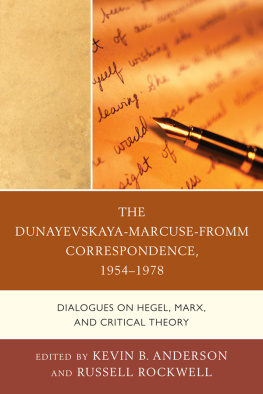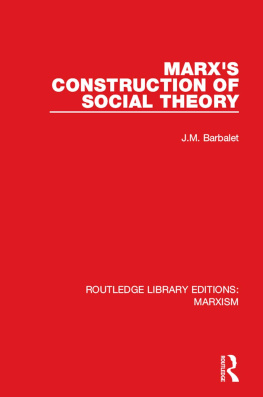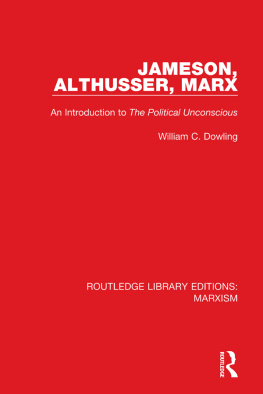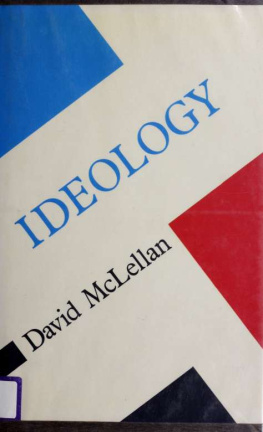ROUTLEDGE LIBRARY EDITIONS:
POLITICAL THOUGHT AND POLITICAL PHILOSOPHY
Volume 17
SOCIAL CLASSES IN MARXIST THEORY
SOCIAL CLASSES IN MARXIST THEORY
ALLIN COTTRELL
First published in 1984 by Routledge & Kegan Paul plc
This edition first published in 2020
by Routledge
2 Park Square, Milton Park, Abingdon, Oxon OX14 4RN
and by Routledge
52 Vanderbilt Avenue, New York, NY 10017
Routledge is an imprint of the Taylor & Francis Group, an informa business
1984 Allin Cottrell
All rights reserved. No part of this book may be reprinted or reproduced or utilised in any form or by any electronic, mechanical, or other means, now known or hereafter invented, including photocopying and recording, or in any information storage or retrieval system, without permission in writing from the publishers.
Trademark notice: Product or corporate names may be trademarks or registered trademarks, and are used only for identification and explanation without intent to infringe.
British Library Cataloguing in Publication Data
A catalogue record for this book is available from the British Library
ISBN: 978-0-367-21961-1 (Set)
ISBN: 978-0-429-35434-2 (Set) (ebk)
ISBN: 978-0-367-21988-8 (Volume 17) (hbk)
ISBN: 978-0-429-26924-0 (Volume 17) (ebk)
Publishers Note
The publisher has gone to great lengths to ensure the quality of this reprint but points out that some imperfections in the original copies may be apparent.
Disclaimer
The publisher has made every effort to trace copyright holders and would welcome correspondence from those they have been unable to trace.
Allin Cottrell
Social Classes in Marxist Theory
First published in 1984
by Routledge & Kegan Paul plc
14 Leicester Square, London WC2H 7PH, England
9 Park Street, Boston, Mass. 02108,USA
464 St Kilda Road, Melbourne,
Victoria 3004, Australia and
Broadway House, Newtown Road,
Henley-on-Thames, Oxon RG9 1EN, England
Set in Baskerville by
Print Origination & Publicity Services Ltd, Aldershot
and printed in Great Britain by
T.J. Press (Padstow) Ltd
Padstow, Cornwall
Allin Cottrell 1984
No part of this book may be reproduced in any form without permission from the publisher, except for the quotation of brief passages in criticism
Library of Congress Cataloging in Publication Data
Cottrell, Allin, 1953-
Social classes in Marxist theory.
Bibliography: p.
Includes index.
1. Social classes. 2. Marxian economics. 3. Social classes Great Britain History 20th century.
I. Title.
HT609.C688 1984 305.583-19126
British Library CIP data available
ISBN 0-7100-9906-1
TO MY FATHER, TOM COTTRELL
Contents
This book is based on a PhD thesis which I presented to the University of Edinburgh in 1981, and I should like to thank my supervisors at Edinburgh, Peter Vandome and John Holloway, for their guidance and for useful discussions of the evolving work. I also wish to thank Robin Murray for his detailed and constructive criticism of the completed thesis. If I have been too obstinate to heed all the objections received from these quarters, I am the only one to blame; the work is, nonetheless, the better for my heeding some of them.
Many of the ideas in the book have also been discussed extensively with Greg Michaelson, Robin Roslender and Paul Cockshott and I have greatly benefited thereby. My greatest intellectual debt is to Paul Cockshott, who has been an invaluable source of illumination, stimulation and pertinent questions. Naturally, none of the above is implicated in the conclusions I reach, or responsible for the blunders and problems which remain.
My thanks are also due to Marlyn Clark and Betty Shires for their rapid production of excellent typescript.
Lawrence & Wishart kindly gave permission to quote extensively from Marx and Engels, Selected Works in One Volume (1968).
Social classes in Marxist theory and in post-war Britain. This book has a double object: first I wish to examine critically the conceptions of social class employed by Marx and by modern Marxist writers, to probe their problematic areas and to propose certain modifications to those conceptions; second I wish to test the conclusions derived from this theoretical reflection against the task of analysing some aspects of the development of class relations in a particular social formation in a particular historical period: Britain over the post-war years and up to the present. In practice these two aims are not so discrete and distinct as this formulation might suggest. The emphasis in the first part of the book is placed upon the writings of Marx and Marxists but this does not exclude consideration of empirically-based arguments, and while the second part contains a greater empirical content relating to post-war Britain the dialogue with Marxist (and of course other) writers continues throughout. It is not a matter of deriving fully fledged concepts then merely applying these to the particular case of postwar Britain.
It is appropriate, before giving an anticipatory summary of the particular arguments offered here, to outline the position from which this book is written. If I say it is a Marxist work that does not in itself tell one very much is perhaps even misleading since it has become increasingly clear over the last two decades, if not over a longer historical period, that there is no unique Marxist orthodoxy to which one can refer with any confidence. Marxs work is open to a number of different interpretations and emphases and what we now see is not a unitary Marxism but a variety of theoretical currents: the subjective Marxism of the Frankfurt school; the structural Marxism of Althusser and his collaborators; the form-determination approach of German Marxist state theory; the historical Marxism of Edward Thompson and others, and so on. And this theoretical diversity is of course paralleled by a political diversity: Leninism, Trotskyism, Maoism, Eurocommunism, and more amorphous political tendencies critical of all of these. Some of these theoretical and political tendencies may claim to be the guardian of the true orthodoxy, but since the demise of Comintern hegemony over the international communist movement none has had the political means of enforcing its claim. There is, however, a theme which is common to all the Marxisms, and that is worth emphasising here: the work of theoretical analysis is fundamentally linked to the political project of the transformation of social relations in the direction of socialism (however socialism is defined by the different tendencies). Marxs eleventh Thesis on Feuerbach may be almost a cliche by now, but it still bears repetition: the philosophers have only interpreted the world in various ways; the point, however, is to change it (Marx and Engels, 1968, p. 30). The questions posed in any theoretical discourse do not select themselves; they are always selected on the basis of some definite criterion of relevance, which one might call the a priori of the discourse. Marxism is quite explicit in arrowing its own











